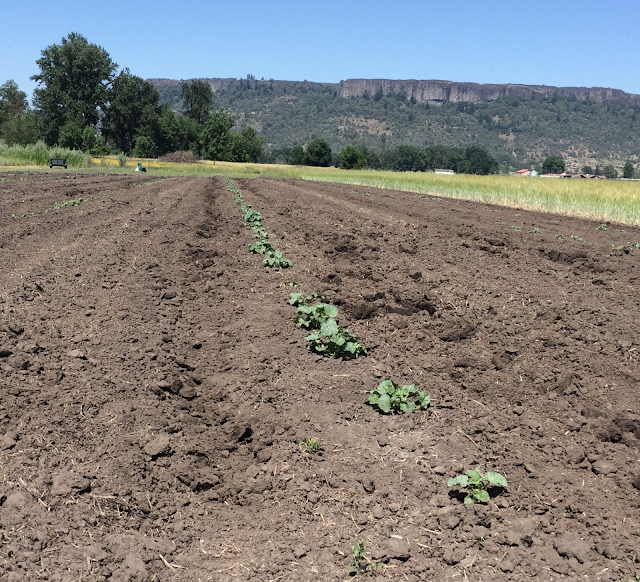To everything (turn, turn, turn)
There is a season (turn, turn, turn)
And a time to every purpose, under heavenA time to be born, a time to die
A time to plant, a time to reap
Turn. Turn. Turn. The Byrds, 1965
It is planting time for melons in Southern Oregon.
We had a cool, wet May. No use planting melons when the soil is cold. It finally warmed up with temperatures in the mid-80s.
I am not growing many melons this year. There is no money in melons, not when grown by a 72-year-old guy whose back gets sore. The effort doesn't come from bending down and picking up a three-pound melon. That is good exercise. The problem is that after picking up the second, third and tenth melon, a tub has 30-plus pounds of them, and I carry them to the end of the row. Then do it again and again. Then stack the tubs into the back of a truck to take to the washstand. Then I wash them, pack them into 45-pound boxes, re-stack the boxes into the truck, drive them to the back door of a supermarket, unload them, and then sell them as 40-pounds of melons. I give "good weight."
Melons now sell in commercial markets for exactly what I sold them for in 1966, less than 20-cents a pound. There are a couple of local boutique places I could sell my melons for a little more, but they want me to tell them they are organic, and I can't do that. Melons are part of the cucurbit family of plants, along with cucumbers, pumpkins, and squash. Cucumber beetles attack and eat the stems and leaves of the very young cucurbits.
 |
| Cucumber beetle, about the size of a ladybug |
I need to control for that with an insecticide--Sevin--that is safe enough that the label says one can put it on tomatoes three days before harvest. I put it on very young melon plants, like these below, long before fruit has formed.
 |
| Just emerged, about 9 days after planting |
 |
| About 30 days after planting |
I consider this perfectly safe, but since I use Sevin, they aren't organic.
I was amused to see melons for sale at a Whole Foods Market in Charlestown neighborhood of Boston a few summers ago. They were selling these:
See the stem. The melon didn't "slip," which is the term for the melon making a clean separation of the stem from the melon, which happens when the melon is ripe. This isn't even a partial slip or a pretense of a slip, cleaned up with a finger nail. The melon was picked very green, then packed and sent to Boston. If the grower got 60% of the retail cost of the melon, that would be about $2.00--three times what I would get.
I would never sell a melon picked that green. The consumer paid top dollar, but the melon is deeply flawed. The taste in a melon comes in the last few days on the vine, when the sugar content rises to push the stem off the vine. Those melons will look good and cut nicely into cubes that display well on a fruit platter, but the melon is inevitably going to be insipid in taste, at best. It wouldn't have the multiple flavor notes of a vine-ripe melon.
 |
| Door panel of my pickup truck |
But notice that I am complaining from the outside. Some grower has a commercial business, and I don't. My complaint isn't really jealousy. I mourn the passage of time. Back when I was in college, I hauled 50-pound boxes of melons all day long, effortlessly. I earned and saved $1,000-$1,200 per summer from the melon crop alone. That was half of a Harvard tuition (now about $60,000 a year.) Today, even if I sold my melons for $2.00 each, the cost of production would mean my profit off an acre of melons would be negligible. My back would kill me.
I grow melons now to give away and to show off to visitors with what I call "melon tourism." I will do a blog post on that shortly.
Kids like dropping melons and eating them in the field. Adults, too.




5 comments:
Food-4-Less used to carry Peter's melons, and there were none better.
What I like about the picture of the field with rows of sprouts coming up is that it isn't covered in black plastic. Why is that the norm with cannabis?
Melon marketing.
I'm looking forward to the cannabis stories.
I have eaten a Sage melon and can unequivocally say that it was the best melon I’ve ever eaten. I used to grow vegetables and have grown nice veggies, but melons are difficult to grow and need more space than I’m willing to devote. Maybe there will be enough this year for some melons to find their way to public radio….
7 years ago, I got some Sage Farm Canteloupe at Ray's in Gold Hill, and have been trying to duplicate that experience ever since. I have room, but I don't have sun or soils to grow yhat kind of vine ripe melon. Maybe this year ?
Post a Comment